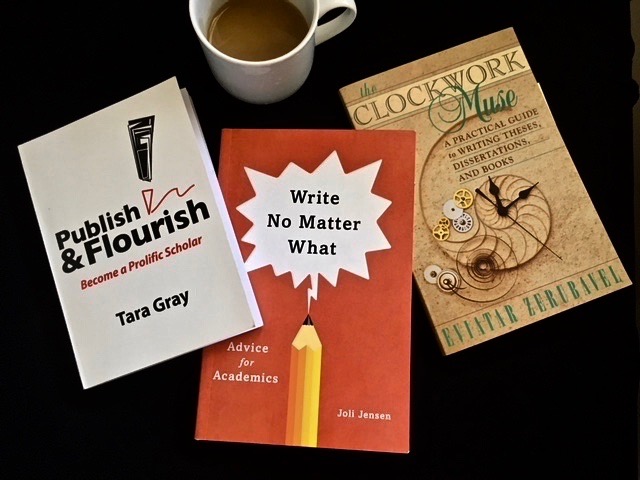by Angelique Haugerud

Writing advice abounds. As an academic author and as former editor-in-chief of two scholarly journals (American Ethnologist and Africa Today), I enjoy talking with authors about how they write. We are all experimenters. No work regimen fits every writer. And yet if we listen to prize-winning authors describe their writing processes, we detect recurrent practices that pay off.
Some techniques appear counterintuitive. We notice, for example, that writing schedules—routinized writing times and even record keeping—are not the enemy of creativity. Less surprisingly, like musicians or athletes, writers cultivate skill through repetition. That means writing (sometimes briefly) nearly every day. A habit of reading fine writing by others also helps—indeed it is vital. We all procrastinate, and we know that success requires the courage to start, whether inspired or not, and the commitment to rewrite, and rewrite, and rewrite. Creative breakthroughs, the distinguished writer Ta-Nehisi Coates remarks, come from “repeated practice over and over and over again….[The process] is not really that mystical.” [1] Yet scholars still fall for the myth, as Joli Jensen (2017, 9) puts it, that “writing just happens for those lucky few who have the right academic stuff.”
The four tips that follow bridge divides of privilege in the academy. Such practices can be incorporated into the busiest of academic lives. Small changes in writing routines can help to diminish anxiety, enhance productivity, and loosen the scholarly imagination. [2]
Tip #1: Try freewriting or a ventilation file when you are stuck or discouraged
When I lead workshops on writing and publishing, I sometimes begin by asking participants to list the first words that come to mind when they think about their own writing process. Their responses: struggle, imagination, fear, doubt, judgment, isolation, inadequacy, blocks, pressure, balance, anxiety, possibilities, overwhelming, procrastination, torture, anxiety versus freedom, fun, inferiority, success, relief, challenging, not being disturbed, musts, rigor, what will people say, intimidating, unorganized, frustrating, boring, rewarding, slow, innovation, aha, time management, mental health, despair, pain, revisions, my dissertation committee, time for a snack, favorite pens, schedule, difficulty starting, agony, joy, friendship, appreciation when it’s over, tiring, sleep, blank page, stillness, love, precision, poetry, rhythm, music, sculpting, clarity. When I collect their lists and read those words aloud to a group, workshop participants laugh as they recognize that their own writing struggles and doubts are not at all atypical.
How can one overcome such worries and revive a stalled piece of writing, or find the courage to begin a paper or chapter? First, try freewriting, as defined by Peter Elbow (1973): write freely for ten minutes without stopping for anything (no worry about syntax or style, no editing or corrections or deletions, and no looking back at what you have written). “If you can’t think of a word or a spelling,” Elbow advises, “just use a squiggle or else write ‘I can’t think what to say, I can’t think what to say’ as many times as you want; or repeat the last word you wrote over and over and over again; or anything else.” The freewriting can be about anything. You might start writing about how you feel about one of your research projects, or about the weather or sounds or colors…or just describe your shoes. By not editing during that ten minutes (perhaps extended to 15 or 20 minutes), freewriting can help an author to find her voice. [3] If practiced regularly, Elbow (1973, 6) says, “it will make writing less blocked because the words will come more easily.”
A “ventilation file” (David Sternberg’s term) is another way to get unstuck or unblocked. Write for 10-15 minutes about your frustrations, uncertainties, or resentments about your project. [4] Then let go of those sentiments for the moment and put the file away. This technique, as Joli Jensen (2014) observes, surfaces negative feelings that deserve attention and that may be worth discussing with friends, colleagues, therapists, or coaches if the act of writing them down from time to time does not itself help to dissipate or resolve them. A ventilation file can be a surprisingly helpful antidote to procrastination or avoidance.
Tip #2: Write daily without distractions, in timed units
Writing nearly every day, even if some days for only 15-30 minutes, is more productive than binge writing. [5] An effective writing routine, first recommended to me by Dorothy Duff-Brown, is 45-minute work units focused solely on writing (i.e., completely free of email or text message alerts, phone calls, social media, and so on), interspersed with short breaks during which music, a short nature walk, or snack are the most beneficial activities. [6] While the number of such units completed in a day varies by individual as well as by project stage and type, most writers in any field—sciences, humanities, or social sciences—can complete at peak productivity and creativity just three or four intensely focused 45-minute work periods per day, Brown says. That doesn’t mean one necessarily halts work for the day at that point, but just that efficiency and creativity are likely to drop off after two or three hours. The prolific sociologist Eviatar Zerubavel (1999) writes for about two hours every morning. Research across fields shows that “most expert teachers and scientists set aside only a couple of hours a day, typically in the morning, for their most demanding mental activities, such as writing about new ideas” (Ericsson et al. 2007). The rest of the work day might include less-taxing activities such as revising text, compiling bibliographies, or organizing data. While each writer can assess her own optimal writing periods and workday length, neuroscience and psychology suggest that starting with the expectation of two or three hours a day for the most focused and demanding work is realistic.
Productivity is enhanced by keeping a record of 45-minute units completed each day. Research Tara Gray cites in Publish and Flourish (2005, 19) shows that keeping a writing log itself enhances output (average number of pages written or revised per year) by a factor of four. (For thoughts on what to count as writing versus research time in your logs, see Gray 2005, 21-22.)
To demystify the writing process further, Zerubavel’s (1999) book The Clockwork Muse, as well as others such as Jensen’s (2017) Write No Matter What, guide the academic author on how to set priorities, find time to write, structure writing time, improve work habits, define timetables, avoid procrastination, and protect time to enjoy other activities for a balanced life. With a plan and daily practice, writing can become more solace than chore.
Tip #3: Report to a writing sponsor or mentor
If you write daily, keep a log, and regularly share a record of time spent writing, you may increase your productivity by a factor of nine or ten, compared with authors who keep no records of writing time and just write occasionally, when they have large blocks of time. [7] The writing sponsor to whom you report weekly does not read your work and need not be a writer. She or he can be a friend, colleague, or family member, and the reporting interchanges require no more than a few minutes.
In addition to this accountability relationship, you may find it helpful to have a writing buddy with whom you exchange work and comments on content, or to participate in writing groups that offer feedback on schedule strategies. “What academic writers need (and rarely get),” Jensen (2017, 137) notes, “is support for the writing process itself. We need to help each other actually get our writing done.”
Tip #4: Work less, get more done
Daydreaming, doodling, playing—the unfocused mind—can contribute to creativity and productivity, according to Harvard neuroscientist & psychiatrist Dr. Srini Pillay and others. [8] Add unfocus to your repertoire, Pillay advises, and train the brain to alternate between intense concentration and deliberate wandering. The ideal, he says, is to be superfocused and relaxed. Nature walks, micro-naps, meditation, and yoga have significant cognitive benefits (Jabr 2013). Such diversions invite imagination and what C. Wright Mills (2000, 211) terms a “playfulness of mind” that helps to unsettle rigid conceptual frames.
For most scholars, academic life is the opposite of the fantasy of ample time to read, reflect, and write. But even in the rush of other commitments, we can reclaim time to translate the music of ideas in our heads into words on a page.
Acknowledgments
I thank participants in the writing and publishing workshops I have led for sharing with those groups their individual musings about writing challenges. I am grateful to Carole McGranahan for the invitation to write an essay for this series and for helpful comments on a draft.
Endnotes
- See Green (2013) for Coates’s interview about his writing process.
- On the latter, see the Appendix, “On Intellectual Craftsmanship,” in Mills (2000, 201), where he refers to “loosening your imagination.”
- See Elbow’s (2017) web page, “A Collection of Quoted Passages About Voice.”
- Sternberg (1981), cited in Jensen (2017, 18).
- Boice (1989), cited in Gray (2005, 13).
- Dorothy Duff-Brown (now retired) is a gifted writing guide who advised dissertation writers and other academic authors, and who conducted writing workshops at the University of California in Berkeley and many other universities. Alexis Shotwell (2011), in her workshop on “pain-free academic writing,” for example, credits Dorothy Duff-Brown. On the cognitive science rationale for avoiding multitasking, see Atchley (2010).
- According to Robert Boice’s (1989) research, as cited by Gray (2005, 19-20).
- See Jabr’s (2013) review of such studies.
References
Atchley, Paul. 2010. “You Can’t Multitask, So Stop Trying.” Harvard Business Review, December 21. Accessed February 12, 2019: https://hbr.org/2010/12/you-cant-multi-task-so-stop-tr.
Boice, Robert. 1989. “Procrastination, Busyness and Bingeing.” Behavioral Research and Therapy 27(6):605-611.
Elbow, Peter. 1973. Writing Without Teachers. Oxford, UK: Oxford University Press. Accessed February 12, 2019: http://peterelbow.com/writing_without_teachers.html.
Elbow, Peter. 2017. “A Collection of Quoted Passages About Voice.” Peter Elbow’s website, August 25. Accessed February 12, 2019: http://peterelbow.com/archive/index.php/2017/08/25/a-collection-of-quoted-passages-about-voice/.
Ericsson, K. Anders, Michael J. Prietula, and Edward T. Cokely. 2007. “The Making of an Expert.” Harvard Business Review, July-August. Accessed February 12, 2019: https://hbr.org/2007/07/the-making-of-an-expert.
Gray, Tara. 2005. Publish and Flourish: Become a Prolific Scholar. Springfield, IL: Phillips Brothers Printers.
Green, Emma. 2013. “Advice on Writing from The Atlantic’s Ta-Nehisi Coates.” Video by The Atlantic, September 27. Accessed February 12, 2019: https://www.theatlantic.com/video/index/280025/advice-on-writing-from-i-the-atlantic-i-s-ta-nehisi-coates/.
Jabr, Ferris. 2013. “Why Your Brain Needs More Downtime.” Scientific American, October 15. Accessed February 12, 2019: https://www.scientificamerican.com/article/mental-downtime/.
Jensen, Joli. 2017. Write No Matter What: Advice for Academics. Chicago: University of Chicago Press.
__. 2014. “From Predator to Pet: Three Techniques for Taming Your Writing Project.” Chronicle Vitae, January 3. Accessed February 12, 1019: https://chroniclevitae.com/news/247-from-predator-to-pet-three-techniques-for-taming-your-writing-project.
Mills, C. Wright. 2000[1959] Appendix: “On Intellectual Craftsmanship.” In The Sociological Imagination, 195-226. Oxford, UK: Oxford University Press.
Shotwell, Alexis. 2011. “Practical Strategies for Pain-Free Academic Writing.” YouTube video, November 3. Accessed February 13, 2019: https://www.youtube.com/watch?v=PXlJ2hKqfmA
Sternberg, David. 1981. How to Complete and Survive a Doctoral Dissertation. New York: St. Martin’s Griffin.
WNYC Studios. 2017. “How Daydreaming Can Help You Focus.” Leonard Lopate Show, May 19. Accessed February 12, 2019: https://www.wnyc.org/story/focusing-how-we-focus/.
Zerubavel, Eviatar. 1999. The Clockwork Muse: A Practical Guide to Writing. Cambridge, MA: Harvard University Press.
Cite as: Haugerud, Angelique. 2019 “On Writing: Four Tips for Hurried (or Harried) Academics,” American Ethnologist website, Feb. 18, 2019. http://americanethnologist.org/features/professionalization/on-writing-four-tips-for-hurried-or-harried-academics
Angelique Haugerud is Professor of Anthropology at Rutgers University and former editor-in-chief of American Ethnologist.




